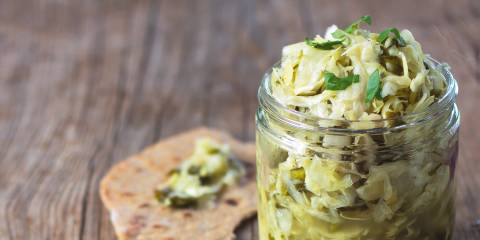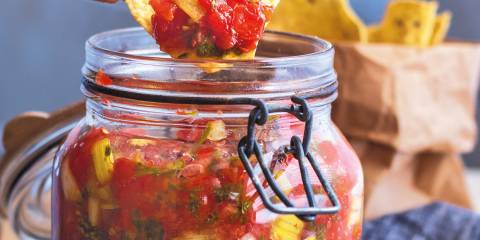Cleopatra knew it. Confucius too. Caesar no doubt hailed it.
We have been eating fermented foods for some 5,000 years or so.
Why? Because they taste good and, as our ancestors knew, they’re good for us.
Beer, wine, coffee, yogurt, soy sauce, sourdough breads, and countless pickled vegetables, all rely on fermentation to give them that little extra zing, that pungency that tickles your taste buds. But perhaps best of all, fermented foods pack a powerful punch that helps promote and maintain good health.
There are so many things you can ferment (sometimes called “pickling”), you’re certain to find foods you and your family will enjoy.
10 Health Benefits of Fermented Foods
-
Better Digestion
Fermented foods are partially digested foods. That means the fermentation has done some of the heavy lifting for your digestive system and digesting these foods is easier. The fermentation in yogurts and kefir, for example, help lactose-intolerant people digest dairy foods.
-
Nutrient Absorption
Try a dill pickle or sauerkraut. These two fermented veggies (cukes and cabbage) are made with lactic acid bacteria. Eating these enzyme-rich foods helps the body absorb nutrients more easily while keeping naturally occurring plant toxins at bay.
-
Boost the Immune System
Because fermented foods are bacteria-based, they support the beneficial bacteria already in our digestive tract. These good bugs strengthen the immune system and help us ward off disease and illness.
-
Increased Vitamin Content
Fermented dairy products, such as kefir or yogurt, release more of the vitamins in foods that our bodies rely on to stay healthy, such as folic acid, B vitamins, riboflavin, and biotin.
-
Longer Shelf Life
Leave a cucumber or quart of milk in your refrigerator and it will go bad in a week to 10 days. Fermented foods, however, last much longer. Refrigerated pickles, salsa, and sauerkraut, for example, will keep for months.
-
Save Money
Whether you can or pickle it yourself (a great hobby most anyone can do, especially with the kids on a summer day, rain or shine), fermented vegetables can lower food costs and stretch your budget while keeping healthy veggies on the plate—in season or out.
-
Tastes Great
It may seem counterintuitive given our propensity for sweet, but that pungent pop you get from fermented foods tastes great.
-
Relieves Constipation
The bacteria in fermented foods stimulates peristalsis (fecal elimination) and thus wards off constipation.
-
Improve Neonatal Health
When a mother has a healthy amount of good bacteria in her own system, those benefits transfer to her fetus and can help prevent neonatal infections.
-
Weight Loss
Some fermented foods, such as sauerkraut, are high in choline, which can help lower blood pressure and metabolize fats more quickly.
Add Fermented Foods to Your Diet
- Use miso to season soups.
- Drink kefir a few times a week.
- Use fermented chutneys as a relish.
- Drink kombucha tea.
- Eat kimchi.
What Is Kombucha Tea?
One of the latest biocultures to join the SCOBY category (a symbiotic colony of bacteria and yeast), kombucha is a fermented tea (less than 0.5% alcohol) whose earliest entry into the lexicon is 1995 but some references to the drink itself date as far back as China’s Qin Dynasty (221-206 BC).
Lab studies published by the U.S. National Institutes of Health (NIH) indicate that the antioxidants present in kombucha may help with healing gastric ulcers.
Other studies conducted in Tunisia and at the University of Washington conclude that kombucha may also help with controlling hypoglycemia in diabetics. The research also showed that kombucha delayed absorption of LDL (lousy) cholesterol while increasing HDL (healthy) cholesterol significantly.
What is Kimchi?
Kimchi is a spicy pickled sauerkraut popular in Asia. It's one of the best food sources of probiotics, which are healthy microflora that supports overall health.
Kimchi is also a great source of beta carotene, calcium, iron, and vitamins.
Read More About Fermentation
Learn more about the benefits of eating fermented foods in The Art of Fermentation by Sandor Katz.







